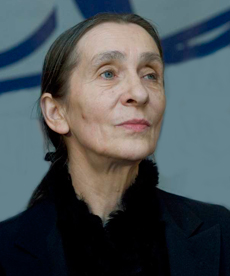
Biography
She was born in 1940 in Solingen. Having already danced in the Solingen children’s ballet, at fourteen Pina Bausch began studying dance with Kurt Jooss at the Folkwang School in Essen.In 1958 Pina Bausch was awarded the Folkwang Leistungspreis and, armed with a grant from the Deutschen Akademischen Austauschdienst (German Academic Exchange Service: DAAD) she spent a year as ’Special Student’ at the Juilliard School of Music in New York. Pina Bausch’s teachers included Antony Tudor, José Limón, dancers from Martha Graham’s company, Alfredo Corvino and Margret Craske. As a dancer she worked with Paul Taylor, Paul Sanasardo and Donya Feuer. She took every opportunity to see performances and absorbed all the various tendencies. Enthused by the diversity of cultural life in New York, she remained for a further year. Now, however, she was obliged to finance her stay and found employment with Antony Tudor at the Metropolitan Opera.
Two years after she had left for New York Kurt Jooss asked her to return to Essen. He had succeeded in re-invigorating the Folkwang Ballet, subsequently re-named the Folkwang Tanzstudio. Pina Bausch danced in works by Jooss, both old and new, as well as assisting him with choreography. As the Folkwang Tanzstudio needed new pieces, she began to choreograph independently and created works such as Fragment or Im Wind der Zeit (In the Wind of Time), for which she was awarded first prize at the International Choreographic Workshop of 1969 in Cologne. She created her first works in Wuppertal as guest choreographer, performed with members of the Folkwang Tanzstudio: Aktionen für Tänzer (Actions for Dancers) in 1971 and the Tannhäuser Bacchanal in 1972. In 1973 the director of the Wuppertal theatres Arno Wüstenhöfer appointed her head of the Wuppertal Ballet, which she soon renamed the Tanztheater Wuppertal.
With the two Gluck operas Iphigenia in Tauris (1974) and Orpheus and Eurydice (1975) she created the first dance operas. In 1974, with Ich bring dich um die Ecke (I’ll Do You In), she entered the frivolous world of popular songs, while Komm, tanz mit mir (Come Dance with Me) used old German folk songs and Renate wandert aus (Renate Emigrates) played on the clichés of operetta (both 1977). Her 1975 choreography for Igor Stravinsky’s Le Sacre du printemps was to become a milestone; the emotional force and unmediated physicality of the piece became trademarks of her work. From Kurt Jooss she had learned ’honesty and precision’. Bausch demonstrated both these values, unleashing dramatic energy of a kind never seen before. In the early Wuppertal years this lead to consternation among press and public. The confrontation with the true motives behind human movements was painful. To many people the grief and despair evoked in 1977’s Blaubart — Beim Anhören einer Tonbandaufnahme von Bela Bartóks Oper ’Herzog Blaubarts Burg’ (Bluebeard. While listening to a tape recording of Bela Bartók’s opera ’Duke Bluebeard’s Castle’) in which passages of the music are repeated relentlessly, felt like torture. But along with her talent for drama Pina Bausch also demonstrated a sense of humour right from the start, seen for instance in her Brecht/Weill double-bill Die sieben Todsünden (The Seven Deadly Sins) and Fürchtet Euch nicht (Don’t Be Afraid) of 1976.
In 1978 Pina Bausch was invited by the director of the Bochum theatre Peter Zadek to create her own version of Shakespeare’s Macbeth. The result of this joint investigation was premiered on 22 April 1978 in Bochum under the title Er nimmt sie an der Hand und führt sie in das Schloss, die andern folgen (He takes her by the hand and leads her into the castle, the others follow) and was almost drowned out by the storm of protest from the audience.
The worldwide development of dance theatre resulted in many international co-productions for the Tanztheater Wuppertal: Viktor, Palermo Palermo and O Dido in Italy, Tanzabend II (Dance Evening II) in Madrid, Ein Trauerspiel (A Tragedy) in Vienna, Nur Du (Only You) in Los Angeles, Der Fensterputzer (The Window Washer) in Hong Kong, Masurca Fogo in Lisbon, Wiesenland (Meadow Land) in Budapest, Água in Brazil, Nefés (Breath) in Istanbul, Ten Chi in Tokyo, Rough Cut in Seoul, Bamboo Blues in India and most recently the new 2009 production in Chile, which Pina Bausch will no longer be able to give a title to. The work, once controversial, eventually developed into a world theatre, which can incorporate all cultural colourations and treats every person with the same respect. It is a theatre that does not aim to preach, instead creating an elemental experience of life, which each spectator is invited to participate in along with the dancers. This global theatre is generous, relaxed in its perception of the world and thoroughly charming towards its audience. It invites them to make peace with life, and trust their courage to go on living and their own strength. A mediator between cultures, it is a messenger of freedom and mutual understanding. It is a theatre which remains free of all ideology and dogma, viewing the world with as little prejudice as possible and acknowledging life — in all its facets. Out of the finds brought back from the journey which begins with each new piece, out of the many small scenes and the many dancers — ever more over the years — a global image of enormous complexity is pieced together, full of surprising turns. The Tanztheater Wuppertal has no obligations other than to human beings and thus to a humanism which recognises no borders.
Pina Bausch has been awarded many prizes and accolades for her work, including the New York Bessie Award in 1984, the German Dance Prize in 1995, the Berlin Theatre Prize in1997, Japan’s Praemium Imperiale in 1999, Monte Carlo’s Nijinsky Prize, the Golden Mask in Moscow in 2005 and the Goethe Prize of the city of Frankfurt in 2008. In June 2007 she was presented with the Venice Biennale Golden Lion for her life’s work and in November that year she was awarded the highly respected Kyoto Prize. In 1997 the German government honoured her with the Order of Merit of the Federal Republic of Germany, the French with the title Commandeur de l’Ordre des Arts et de Lettre in 1991 and Chevalier de la Légion d’Honneur in 2003. Several universities have awarded her an honorary doctorate.
On 30 June 2009 Pina Bausch’s life journey reached its end. She will be remembered as one of the most significant choreographers of the twentieth century.



